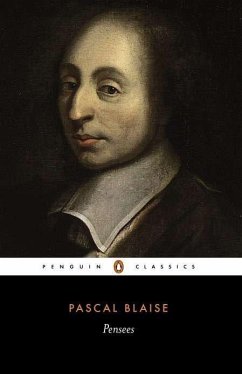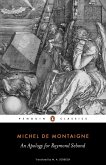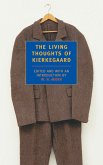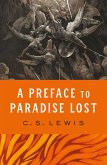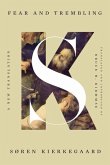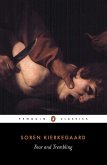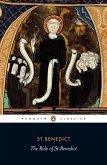11,99 €
inkl. MwSt.
Versandfertig in über 4 Wochen

6 °P sammeln
- Broschiertes Buch
- Merkliste
- Auf die Merkliste
- Bewerten Bewerten
- Teilen
- Produkt teilen
- Produkterinnerung
- Produkterinnerung
A collection of philosohical fragments, notes and essays in which the author explores the contradictions of human nature in pscyhological, social, metaphysical and - above all - theological terms.
Andere Kunden interessierten sich auch für
![An Apology for Raymond Sebond An Apology for Raymond Sebond]() Michel MontaigneAn Apology for Raymond Sebond14,99 €
Michel MontaigneAn Apology for Raymond Sebond14,99 €![The Living Thoughts of Kierkegaard The Living Thoughts of Kierkegaard]() Soren KierkegaardThe Living Thoughts of Kierkegaard15,99 €
Soren KierkegaardThe Living Thoughts of Kierkegaard15,99 €![A Preface to Paradise Lost A Preface to Paradise Lost]() C. S. LewisA Preface to Paradise Lost17,99 €
C. S. LewisA Preface to Paradise Lost17,99 €![Fear and Trembling Fear and Trembling]() SÃ ren KierkegaardFear and Trembling25,99 €
SÃ ren KierkegaardFear and Trembling25,99 €![Fear and Trembling Fear and Trembling]() SÃ ren KierkegaardFear and Trembling17,99 €
SÃ ren KierkegaardFear and Trembling17,99 €![The Rule of Benedict The Rule of Benedict]() St BenedictThe Rule of Benedict16,99 €
St BenedictThe Rule of Benedict16,99 €![Mere Christianity Mere Christianity]() C. S. LewisMere Christianity20,99 €
C. S. LewisMere Christianity20,99 €-
-
-
A collection of philosohical fragments, notes and essays in which the author explores the contradictions of human nature in pscyhological, social, metaphysical and - above all - theological terms.
Hinweis: Dieser Artikel kann nur an eine deutsche Lieferadresse ausgeliefert werden.
Hinweis: Dieser Artikel kann nur an eine deutsche Lieferadresse ausgeliefert werden.
Produktdetails
- Produktdetails
- Verlag: Penguin Books Ltd
- Revised edition
- Seitenzahl: 368
- Erscheinungstermin: 1. Dezember 1995
- Englisch
- Abmessung: 198mm x 129mm x 18mm
- Gewicht: 272g
- ISBN-13: 9780140446456
- ISBN-10: 0140446451
- Artikelnr.: 22440633
- Herstellerkennzeichnung
- Libri GmbH
- Europaallee 1
- 36244 Bad Hersfeld
- gpsr@libri.de
- Verlag: Penguin Books Ltd
- Revised edition
- Seitenzahl: 368
- Erscheinungstermin: 1. Dezember 1995
- Englisch
- Abmessung: 198mm x 129mm x 18mm
- Gewicht: 272g
- ISBN-13: 9780140446456
- ISBN-10: 0140446451
- Artikelnr.: 22440633
- Herstellerkennzeichnung
- Libri GmbH
- Europaallee 1
- 36244 Bad Hersfeld
- gpsr@libri.de
Blaise Pascal; Translated with an Introduction by A. J. Krailsheimer
Pensees - Blaise Pascal Translated with a Revised Introduction by A. J.
Krailsheimer
Introduction
Concordance between the present edition and that of P. Sellier
Select Bibliography
Section One: Papers Classified by Pascal (Pascal's Titles)
I. Order
II. Vanity
III. Wretchedness
IV. Boredom
V. Causes and effects
VI. Greatness
VII. Contradictions
VIII. Diversion
IX. Philosophers
X. The Sovereign Good
XI. APR
XII. Beginning
XIII. Submission and use of reason
XIV. Excellence of this means of proving God
XV. Transition from knowledge of man to knowledge of God
XVb. Nature is corrupt
XVI. Falseness of other religions
XVII. Make religion attractive
XVIII. Foundations
XIX. Figurative law
XX. Rabbinism
Section Two: Papers Not Classified by Pascal (Translator's Titles)
I. Various
II. The Wager
III. Against indifference
IV. Eternal judgment. Christ.
V. Two essential truths of Christianity
VI. Advantages of Jewish people
VII. Sincerity of Jewish people
VIII. True Jews and true Christians have same religion
IX. Particularity of Jewish people
X. Perpetuity of Jewish people
XI. Proofs of religion
XII. Prophecies
XIII. Particular prophecies
XIV. Daniel
XV. Isaiah and Jeremiah: Latin texts
XVI. Prophecies
XVII. Prophecies
XVIII. Prophecies: the Jews and Christ
XIX. Figurative meanings
XX. Belief. Classical quotations
XXI. Two types of mind
XXII. Mathematical and intuitive mind
XXIII. Various
XXIV. Various
XXV. Human nature. Style. Jesuits etc.
XXVI. Sources of error
XXVII. Diversion. Draft Prefaces
XXVIII. Superiority of Christianity. Human behaviour
XXIX. Relativity of human values. The Bible and its truth
XXX. Habit and conversion
XXXI. Figurative language in Bible. Human relations
Section Three: Miracles
XXXII. Opinion of Saint-Cyran
XXXIII. Rules for miracles
XXIV. Miracles for Port Royal against Jesuits
Section Four: Fragments Not Found in the First Copy
A. The Memorial
B. Fragments in the Recueil Original
The Mystery of Jesus
C. Fragments from other sources
Self-love
Saying Attributed to Pascal
Additional Pensées
Krailsheimer
Introduction
Concordance between the present edition and that of P. Sellier
Select Bibliography
Section One: Papers Classified by Pascal (Pascal's Titles)
I. Order
II. Vanity
III. Wretchedness
IV. Boredom
V. Causes and effects
VI. Greatness
VII. Contradictions
VIII. Diversion
IX. Philosophers
X. The Sovereign Good
XI. APR
XII. Beginning
XIII. Submission and use of reason
XIV. Excellence of this means of proving God
XV. Transition from knowledge of man to knowledge of God
XVb. Nature is corrupt
XVI. Falseness of other religions
XVII. Make religion attractive
XVIII. Foundations
XIX. Figurative law
XX. Rabbinism
Section Two: Papers Not Classified by Pascal (Translator's Titles)
I. Various
II. The Wager
III. Against indifference
IV. Eternal judgment. Christ.
V. Two essential truths of Christianity
VI. Advantages of Jewish people
VII. Sincerity of Jewish people
VIII. True Jews and true Christians have same religion
IX. Particularity of Jewish people
X. Perpetuity of Jewish people
XI. Proofs of religion
XII. Prophecies
XIII. Particular prophecies
XIV. Daniel
XV. Isaiah and Jeremiah: Latin texts
XVI. Prophecies
XVII. Prophecies
XVIII. Prophecies: the Jews and Christ
XIX. Figurative meanings
XX. Belief. Classical quotations
XXI. Two types of mind
XXII. Mathematical and intuitive mind
XXIII. Various
XXIV. Various
XXV. Human nature. Style. Jesuits etc.
XXVI. Sources of error
XXVII. Diversion. Draft Prefaces
XXVIII. Superiority of Christianity. Human behaviour
XXIX. Relativity of human values. The Bible and its truth
XXX. Habit and conversion
XXXI. Figurative language in Bible. Human relations
Section Three: Miracles
XXXII. Opinion of Saint-Cyran
XXXIII. Rules for miracles
XXIV. Miracles for Port Royal against Jesuits
Section Four: Fragments Not Found in the First Copy
A. The Memorial
B. Fragments in the Recueil Original
The Mystery of Jesus
C. Fragments from other sources
Self-love
Saying Attributed to Pascal
Additional Pensées
Pensees - Blaise Pascal Translated with a Revised Introduction by A. J.
Krailsheimer
Introduction
Concordance between the present edition and that of P. Sellier
Select Bibliography
Section One: Papers Classified by Pascal (Pascal's Titles)
I. Order
II. Vanity
III. Wretchedness
IV. Boredom
V. Causes and effects
VI. Greatness
VII. Contradictions
VIII. Diversion
IX. Philosophers
X. The Sovereign Good
XI. APR
XII. Beginning
XIII. Submission and use of reason
XIV. Excellence of this means of proving God
XV. Transition from knowledge of man to knowledge of God
XVb. Nature is corrupt
XVI. Falseness of other religions
XVII. Make religion attractive
XVIII. Foundations
XIX. Figurative law
XX. Rabbinism
Section Two: Papers Not Classified by Pascal (Translator's Titles)
I. Various
II. The Wager
III. Against indifference
IV. Eternal judgment. Christ.
V. Two essential truths of Christianity
VI. Advantages of Jewish people
VII. Sincerity of Jewish people
VIII. True Jews and true Christians have same religion
IX. Particularity of Jewish people
X. Perpetuity of Jewish people
XI. Proofs of religion
XII. Prophecies
XIII. Particular prophecies
XIV. Daniel
XV. Isaiah and Jeremiah: Latin texts
XVI. Prophecies
XVII. Prophecies
XVIII. Prophecies: the Jews and Christ
XIX. Figurative meanings
XX. Belief. Classical quotations
XXI. Two types of mind
XXII. Mathematical and intuitive mind
XXIII. Various
XXIV. Various
XXV. Human nature. Style. Jesuits etc.
XXVI. Sources of error
XXVII. Diversion. Draft Prefaces
XXVIII. Superiority of Christianity. Human behaviour
XXIX. Relativity of human values. The Bible and its truth
XXX. Habit and conversion
XXXI. Figurative language in Bible. Human relations
Section Three: Miracles
XXXII. Opinion of Saint-Cyran
XXXIII. Rules for miracles
XXIV. Miracles for Port Royal against Jesuits
Section Four: Fragments Not Found in the First Copy
A. The Memorial
B. Fragments in the Recueil Original
The Mystery of Jesus
C. Fragments from other sources
Self-love
Saying Attributed to Pascal
Additional Pensées
Krailsheimer
Introduction
Concordance between the present edition and that of P. Sellier
Select Bibliography
Section One: Papers Classified by Pascal (Pascal's Titles)
I. Order
II. Vanity
III. Wretchedness
IV. Boredom
V. Causes and effects
VI. Greatness
VII. Contradictions
VIII. Diversion
IX. Philosophers
X. The Sovereign Good
XI. APR
XII. Beginning
XIII. Submission and use of reason
XIV. Excellence of this means of proving God
XV. Transition from knowledge of man to knowledge of God
XVb. Nature is corrupt
XVI. Falseness of other religions
XVII. Make religion attractive
XVIII. Foundations
XIX. Figurative law
XX. Rabbinism
Section Two: Papers Not Classified by Pascal (Translator's Titles)
I. Various
II. The Wager
III. Against indifference
IV. Eternal judgment. Christ.
V. Two essential truths of Christianity
VI. Advantages of Jewish people
VII. Sincerity of Jewish people
VIII. True Jews and true Christians have same religion
IX. Particularity of Jewish people
X. Perpetuity of Jewish people
XI. Proofs of religion
XII. Prophecies
XIII. Particular prophecies
XIV. Daniel
XV. Isaiah and Jeremiah: Latin texts
XVI. Prophecies
XVII. Prophecies
XVIII. Prophecies: the Jews and Christ
XIX. Figurative meanings
XX. Belief. Classical quotations
XXI. Two types of mind
XXII. Mathematical and intuitive mind
XXIII. Various
XXIV. Various
XXV. Human nature. Style. Jesuits etc.
XXVI. Sources of error
XXVII. Diversion. Draft Prefaces
XXVIII. Superiority of Christianity. Human behaviour
XXIX. Relativity of human values. The Bible and its truth
XXX. Habit and conversion
XXXI. Figurative language in Bible. Human relations
Section Three: Miracles
XXXII. Opinion of Saint-Cyran
XXXIII. Rules for miracles
XXIV. Miracles for Port Royal against Jesuits
Section Four: Fragments Not Found in the First Copy
A. The Memorial
B. Fragments in the Recueil Original
The Mystery of Jesus
C. Fragments from other sources
Self-love
Saying Attributed to Pascal
Additional Pensées
